Myths about Public Speaking- IELTS Reading Answers
Table of Contents

Limited-Time Offer : Access a FREE 10-Day IELTS Study Plan!
The Academic passage ‘Myths about Public Speaking’ is a reading passage that appeared in an IELTS Test. Try to find the answers to get an idea of the difficulty level of the passages in the actual reading test. If you want more passages to solve, try taking one of our IELTS reading practice tests.
Reading Passage
Myths about Public Speaking
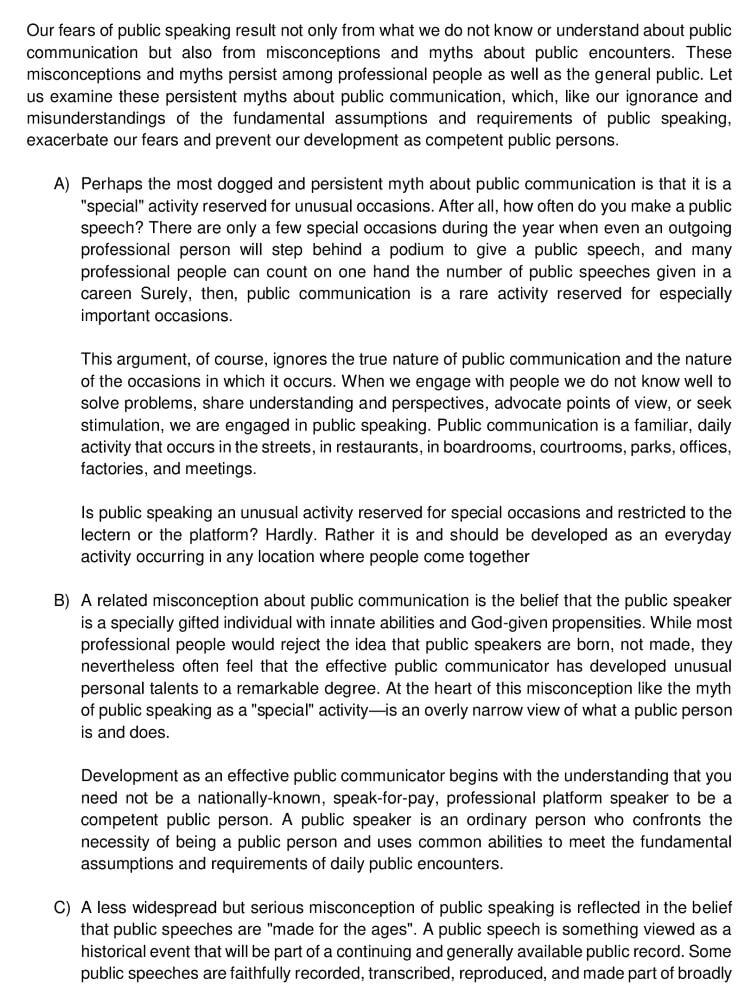
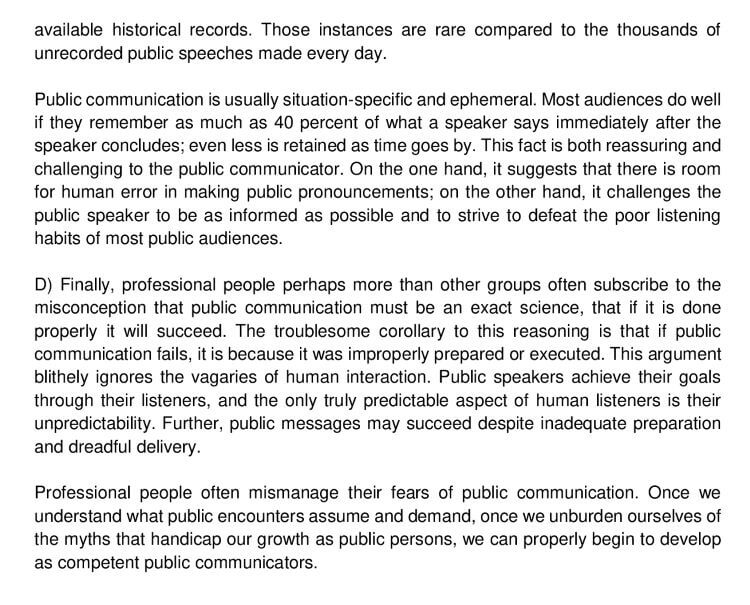
Questions 1-5
THE reading passage “Myths About Public Speaking” has four sections A-D. In boxes 1-5 on your answer sheet write the appropriate letter A, B, C, or D to show in which section you can find a discussion of the following points. You may use any letter more than once.
1 A person’s ability to be a public speaker.
2 Whether public speeches are remembered for a long time.
3 A definition of public speaking.
4 The relationship of preparation to success in public speaking.
5 Retention rates as a challenge to public speakers.
Questions 6-11
DO boxes 6-11 on your answer sheet write
YES: if the statement agrees with the writer
NO: if the statement does not agree with the writer
NOT GIVEN: if there is no information about this in the passage
6 Very few people can become good public speakers.
7 Public communication is an ordinary daily activity.
8 Public speaking can be learned at specially designated schools
9 Most good public speakers lead happy and productive lives.
10 It is impossible to predict how a speech will be received.
11 There is little place for public speaking in the life of the ordinary person.
Questions 12-14
USE information from the reading passage in the following sentences. Use no more than three words or a number. write yore answers in boxes 12-14 on your sheet
12 The writer defines public speaking as any activity where people jointly explore problems, knowledge, attitudes, and opinions, or look for_______________
13 At the end of most public speeches, most audiences immediately forget about __________ of what they have just heard.
14 Because most public speeches are short-lived, the speaker should work to counteract the ___________________of the listeners.
Reading Answer
1 Answer: B
Question type: Matching Information
Answer location: Paragraph B
Answer explanation: The initial lines of paragraph B states that a related misconception about public communication is the belief that the public speaker is a specially gifted individual with innate abilities and God-given propensities. These lines suggest that a person possessing public speaking is especially gifted with innate abilities and God-given propensities. Thus, a person’s ability to be a public speaker is mentioned in paragraph B, so, the answer is B.
2 Answer: C.
Question type: Matching Information
Answer location: Paragraph C
Answer explanation: Paragraph C states that a less widespread but serious misconception of public speaking is reflected in the belief that public speeches are “made for the ages”. These lines indicate a serious error in public speaking is reflected in the belief that public speeches are made for the ages (remembered for a long time). Thus, we can find a reference for the statement, whether public speeches are remembered for a long time can be found in paragraph C, so, the answer is C.
3 Answer: A
Question type: Matching Information
Answer location: Paragraph A, line 9
Answer explanation: The 9th line of paragraph A defines public speaking, that is, Public communication as a familiar, daily activity that occurs in the streets, in restaurants, in boardrooms, courtrooms, parks, offices, factories, and meetings. These lines indicate the definition of public speaking. So, the answer is A.
4 Answer: D
Question type: Matching Information
Answer location: Paragraph D, line 2
Answer explanation: The 2nd line of paragraph D illustrates that the troublesome corollary to this reasoning is that if public communication fails, it is because it was improperly prepared or executed. We can deduce from these lines that a difficult preposition is that if public communication fails, it is because of improper preparation or execution. Thus, we can find references for the relationship of preparation to success in public speaking, so, the answer is D.
5 Answer: C
Question type: Matching Information
Answer location: Paragraph C, line 6
Answer explanation: The 6th line of paragraph C reveals that Public communication is usually situation-specific and ephemeral. Most audiences do well if they remember as much as 40 percent of what a speaker says immediately after the speaker concludes; even less is retained as time goes by. These lines suggest that at the end of public speeches, most of the audiences immediately forget about 60% of what they have just heard.
6 Answer: No
Question type: Yes/ No/ Not Given
Answer location: Paragraph A, last line
Answer explanation: The last line of paragraph A illustrates, “Is public speaking an unusual activity reserved for special occasions and restricted to the lectern or the platform? Hardly. Rather it is, and should be developed as, an everyday activity occurring in any location where people come together.” We can understand that a question is being asked whether public speaking is reserved for only special occasions and is restricted to the lectern or the platform. To which, the author replies saying hardly, rather public speaking is and should be promoted as an everyday activity in different places where people come together. As a result, anyone willing to address the gathering can become a public speaker. Thus, the statement contradicts the information, so, the answer is No.
7 Answer: Yes
Question type: Yes/ No/ Not Given
Answer location: Paragraph A, last line
Answer explanation: The last line of paragraph A states, “If public speaking an unusual activity reserved for special occasions and restricted to the lectern or the platform? Hardly. Rather it is, and should be developed as, an everyday activity occurring in any location where people come together.” These lines reveal that public speaking should not be an unusual activity and that everyone should consider it as an ordinary daily activity. Thus, the statement agrees with the information, so, the answer is Yes.
8 Answer: Not Given
Question type: Yes/ No/ Not Given
Answer location: Paragraph B
Answer explanation: Paragraph B states the fact that public communication is the belief that the public speaker is a specially gifted individual with innate abilities and God-given propensities. These lines suggest that public speaking is an innate ability and God-given propensity. However, there’s no reference to the fact that public speaking can be learned at special designated schools. Thus, the answer is Not Given.
9 Answer: Not Given
Question type: Yes/ No/ Not Given
Answer location: Paragraph B
Answer explanation: We find reference for public speaker in paragraph B, which states that public communication is the belief that the public speaker is specially gifted individual with innate abilities and God-given propensities. These lines indicate a person’s ability to be a public speaker. However, there’s no reference to the fact that most public speakers lead happy and productive lives. Thus, the answer is Not Given.
10 Answer: Yes
Question type: Yes/ No/ Not Given
Answer location: Paragraph D, line 2
Answer explanation: The 2nd line of paragraph D suggests that the troublesome corollary to this reasoning is that if public communication fails, it is because it was improperly prepared or executed. This argument blithely ignores the vagaries of human interaction. Public speakers achieve their goals through their listeners, and the only truly predictable aspect of human listeners is their unpredictability. These lines suggest the difficult proposition that if public speaking fails, its because it was prepared or delivered improperly and this argument ignores the unexpected change of human interaction. Public communicators achieve their goals through their audiences and the only predictable factor of the audience is their uncertainty. Thus, it is impossible to predict how a speech will be received by the audience. Therefore, the statement agrees with the information, so, the answer is Yes.
11 Answer: No
Question type: Yes/ No/ Not Given
Answer location: Paragraph A, line 5
Answer explanation: The 5th line of paragraph A illustrates that public communication is a familiar, daily activity that occurs in the streets, in restaurants, in boardrooms, courtrooms, parks, offices, factories and meetings. These lines define public speaking as a familiar, daily activity that occurs everywhere. As a result, public speaking can be found anywhere in the life of an ordinary person. Thus, the statement disagrees with the fact, so, the answer is No.
12 Answer: Stimulation
Question type: Sentence Completion
Answer location: Paragraph A, line 5
Answer explanation: The 5th line of paragraph A illustrates that when we engage with people we do not know well to solve problems, share understanding and perspectives, advocate points of view, or seek stimulation, we are engaged in public speaking. These lines suggest that when a person connects with other people, they don’t know how to solve problems, share understanding or perspectives, advocate opinions or seek encouragement. Thus, the writer defines public speaking as an activity where people jointly explore problems, knowledge, opinions, or look for stimulation. Thus, the answer is stimulation.
13 Answer: 60%
Question type: Sentence Completion
Answer location: Paragraph C, line 4
Answer explanation: The 4th line of paragraph C states that public communication is usually situation-specific and ephemeral. Most audiences do well if they remember as much as 40 percent of what a speaker says immediately after the speaker concludes; even less is retained as time goes by. We can deduce from these lines that public communication lasts not for a very long time. However, most of the audience do well if they remember as much as 40% of what the speaker says, i.e, at the end of the most public speeches, most of the audience (about 60%) immediately forget what they just heard from the speaker. Thus, the answer is 60%.
14 Answer: poor listening habits
Question type: Sentence Completion
Answer location: Paragraph C, line 6
Answer explanation: The 6th line in paragraph C states that it challenges the public speaker to be as informed as possible and to strive to defeat the poor listening habits of most public audiences. These lines indicate that most public speeches are short-lived and the public speaker is required to be as informed as possible, and strive to defeat the poor listening habits of the audiences, i.e, the speaker should work to counteract the poor listening habits of the listeners. Thus, the answer is poor listening habits.
Check More IELTS Reading Answers
Practice IELTS Reading based on question types

Start Preparing for IELTS: Get Your 10-Day Study Plan Today!
Explore other Reading Topics

Janice Thompson
Recent Articles

Kasturika Samanta

Kasturika Samanta
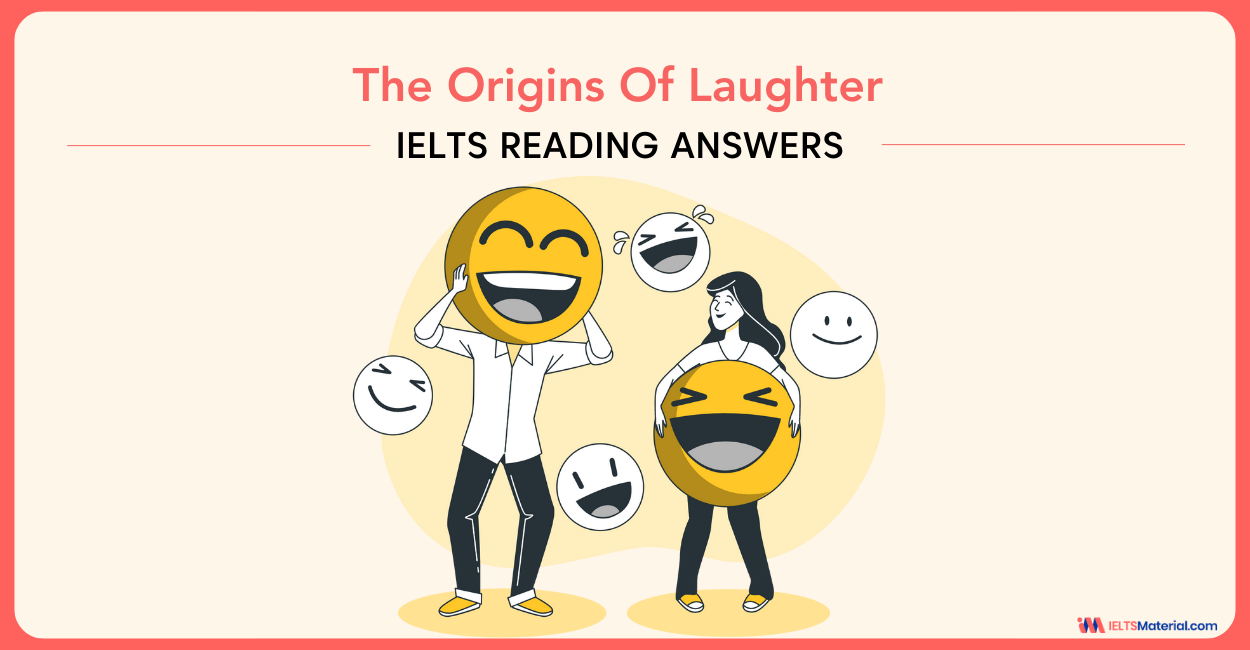
Janice Thompson


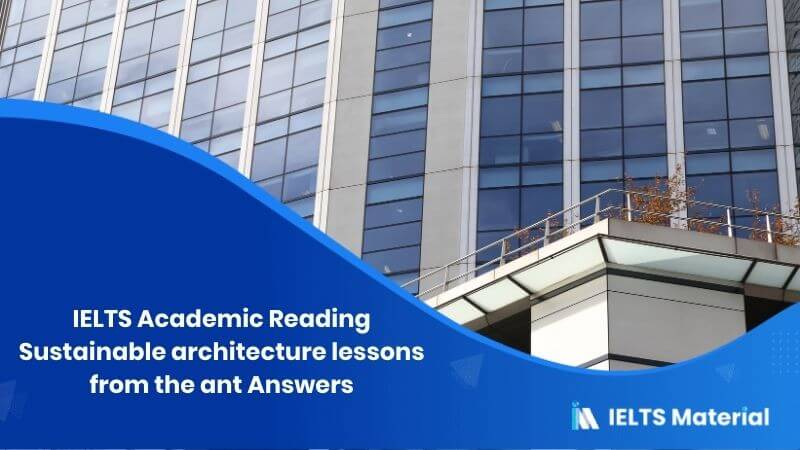
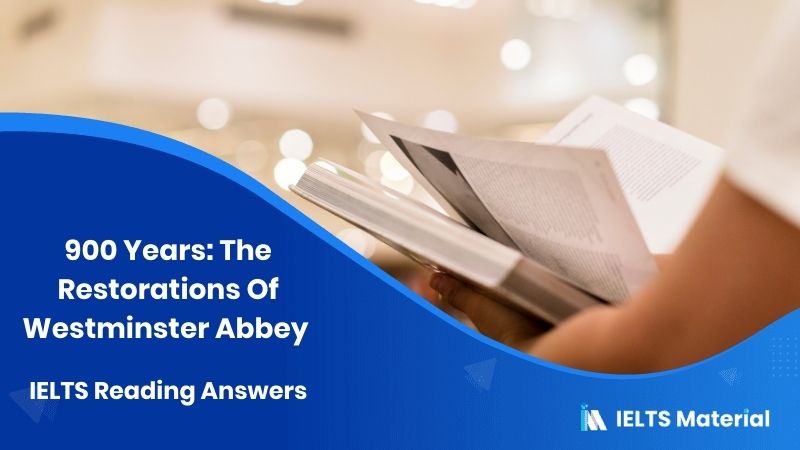




Post your Comments